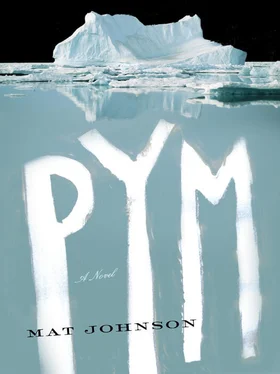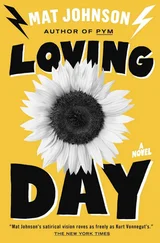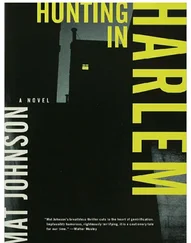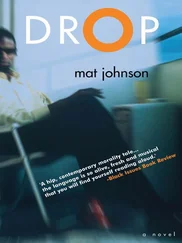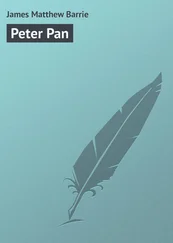“They blew that shit up, dog,” was the first thing Garth had said to me in hours. I don’t even know when or how he’d managed to clean his face and arms off. The big man got off his snowmobile and walked over to the edge of the burning hole, sat down on its side, and let his legs dangle over. That was when I first realized that Garth was in shock, oddly enough. And I knew I must be in shock too, although this knowledge registered no further. I got off my snowmobile to see it, to look in the crater at the destruction that had been created. The only thing I recognized was the roof, the same one I’d climbed up to several times to adjust the satellite dish. That antenna was now gone, possibly blown free, and what remained of the wreckage was only black and smoking and sinking into the frozen ground, reeking of burnt rubber and unnameable plastics and pork rinds.
“Blew it to high hell,” Garth repeated, pointing now at the massive, smoking crater that cut off our path to the ocean.
What I saw as I continued to look into the ruins was something far more horrific. Poking through the snow, I could see the charred gray limbs of the beasts in question as well, probably contributing to the pork smell.
This was not just a crater, this was a crevice, spreading a good fifty yards across. And then, lengthwise, it spread far, far beyond that. Leading back along the same line that Augustus’s tunnel once had was a tunnel which had clearly become little more than debris and sunlight like the rest of them. I didn’t know if every Tekelian tunnel had collapsed, but I knew that all those close to the surface must have, and that, even if the village still existed below, there was no way to return to it now.
We rode along the crevice’s edge, following it back in the direction I knew Tekeli-li to be. Looking to my side as I drove, I waited for the massive crack in the ground to narrow and close, but it didn’t. It just got wider. And then, it got so big that, had Garth not been focusing primarily on what lay in front of us, we might have driven directly into it.
At the sight of Tekeli-li, or at least where I estimated Tekeli-li to have once been carved, there was now only a space the size of a small village sunken into the ground. It looked as if a great and literal god had poked his hand from the sky and with one massive finger pushed the snow down. There was no sign of our vehicles, or the captors who held both. Just more broken fragments of ice that had once appeared to be solid ground.
Let me say here that I never saw the remains of any more of the species and so can’t make concrete assertions about them. Nor do I have any information other than what I am currently presenting. But out of respect for all who must have fallen in the ice’s collapse, regardless of race or species, Garth and I did say what words we could, and acknowledged the already present silence. After this, there was little more for us to do but move on. It was time to sail for Tsalal. Or to die in the noble effort of trying.
Following a groggy Pym’s instructions, we rode to the southernmost point of what was once Tekeli-li, to the edge of the Ross Sea, and waited for the tide to begin its recession. Then, making our own room in the boat next to our semiconscious passenger, we pushed off into the water. Once we had sufficiently broken free from the mainland, Garth and I pulled our paddles in, letting faith and the surprisingly strong current pull us away.
The following I take from my written notes, composed during the journey. While I can’t pretend strict accuracy in these dates, since we didn’t have the battery power to run the electronic devices necessary for even figuring that out, I will note that they are accurate to the best of my knowledge. As was done before, they are given principally with a view to perspicuity of narration, and as set down in my pencil memorandum:
March 1
Although it is a region of novelty and wonder, I am glad to be leaving that world behind. When I think back to Thomas Karvel and his dome, I do not wonder about the last moments of his life, or of his art or even of Garth’s lost collection — both of which are taboo subjects with the big man. No, despite all the free time, I find myself thinking about Karvel’s pigeons. Or rather, why is the white dove so highly regarded because of its lack of pigmentation? How is it that something so minor as the color of a bird’s feathers can make the difference between being regarded as the international symbol of peace and being the urban symbol of filth and nuisance? It might be argued that this disparity has to do not just with the vagaries of shade but rather with differences in breed, but since I can’t tell the differences in species, that distinction would be lost on me. What then about the mice? my mind drifts to. Why are albino mice deemed worthy to be kept as pampered personal pets while their nearly identical darker brothers are viewed completely as pests? Does whiteness hold so much value for us that its presence is a wealth in itself?
Pym is awake. No, he has begun to wake, his consciousness rising in cycles, then sinking back into a stupor as the wealth of alcohol poison in his system works its way out again. In the last cycle, finding himself in a sailboat at sea, he weakly demanded to know where we were taking him, despite the fact that earlier he had mumbled to us the site we should depart from to find it. “Tsalal, dog,” Garth said to him. “Tsalal,” Pym said back in a hissing sound that sizzled off his lips until he drifted to unconsciousness once more.
March 2
On the following morning, Arthur Pym woke up once again, this time more coherent than I had ever seen him, and extremely thirsty and complaining of nausea, a symptom that only got dramatically worse when we told him yet again where we were going.
March 3
True to his word, the instructions Pym had given earlier proved to be right. This is to his great luck, because his endless nonsensical discussion of coppering versus whaling in the New England maritime economy is annoying and, had he been wrong, I know I would have strangled him by now. Amazingly, around the three of us there stretched an expanse of broken ice which filled the water’s surface like the foam atop a fountain soda. In front of as well as behind us on our stretch of roadlike path, the water was both improbably warm and ice free, the current shooting us forward, out of the frozen way, almost as if this hot spring poured from the center of the earth through a hole at the pole and now was rushing north to make the trip to the other pole and down once more.
Garth shivers all the time, wrapped in many blankets though he is. Still, he barely talks to me.
March 4
The highlight of our day was when, after a black blanket was laid over Arthur Pym’s face in order to keep his hanging tongue from freezing, he woke with a horrific scream. “Tsalal. Tsalal,” he kept murmuring in a drowsy stupor, falling back asleep without removing the thing.
March 5
The polar cold is retreating as the current pushes us on, squeezing us out and up. Garth, at the front of the boat, is inscrutable to me, as quiet as the waters we sit on. I don’t know if he’s mourning our lost compatriots or his life’s art collection more, but I assume both weigh significantly on his thick shoulders. As it becomes warmer, the dread I have long been feeling begins to abandon me, along with the numbness I realize I had become so accustomed to. The closer we get to the heat, the more I feel my existence . The more I am ready to feel. To see color, to feel the dark earth, to be alive.
March 6
In the morning, I saw the darkest cloud I have ever witnessed coming from the distance. But it could not be a cloud, because it took up the whole sky, coming in a line and pulling over it like a blanket until it was directly above us. Then it started snowing. Except, this wasn’t snow. It was not white, it was gray. It was not cold, rather it was warm to the touch. It was ash. Volcanic ash. We are near land, and land where there is a volcano that can produce this. Although for the moment this ash blocked the very sun, I was elated about this fact, and shared this across the boat with Garth Frierson. Garth just nodded, and asked me to pass the Cheetos, of which we still have many. Arthur Pym, for his part, threw himself on his face in the bottom of the boat, and no persuasions could induce him to get up.
Читать дальше
